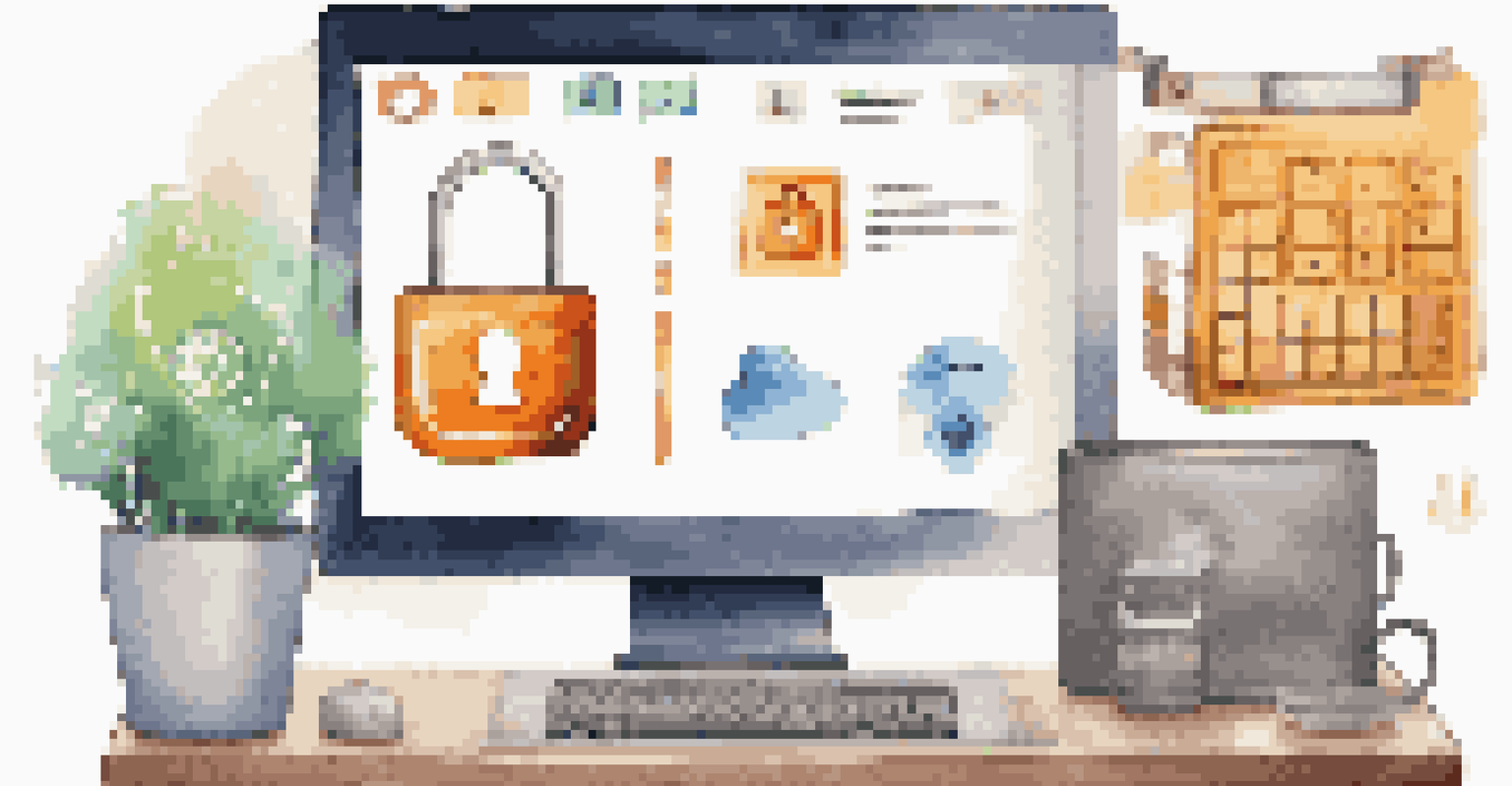Digital Payment Security: Best Practices for Businesses

Understanding the Importance of Digital Payment Security
In today's digital landscape, ensuring secure payment processes is paramount for businesses. With online transactions becoming increasingly common, the risk of cyber threats looms larger than ever. A breach can not only lead to financial losses but also damage your brand's reputation.
The greatest threat to our planet is the belief that someone else will save it.
Consumers expect their payment information to be handled with care, and businesses that fail to prioritize security risk losing customer trust. By understanding the landscape of digital payment security, companies can take proactive measures to protect their assets and their customers.
Ultimately, investing in payment security is not just about compliance; it's about building a secure environment that fosters customer confidence and loyalty. A secure payment system creates a win-win situation for both businesses and their clients.
Implementing Strong Encryption Methods
Encryption is like a digital lock that protects sensitive information as it travels across the internet. Implementing strong encryption methods, such as SSL (Secure Socket Layer), ensures that data exchanged between your business and customers remains confidential. This is akin to sending a sealed letter instead of a postcard.

Using encryption not only safeguards payment details but also protects against data interception by malicious actors. When customers see that a site is secured with SSL, they are more likely to proceed with their transactions. It’s the digital equivalent of having a security guard at your storefront.
Prioritize Digital Payment Security
Businesses must invest in digital payment security to protect customer information and maintain trust.
Moreover, regularly updating your encryption protocols keeps your defenses strong against evolving threats. Just as a physical lock may need an upgrade over time, so too should your digital security measures evolve to counter new vulnerabilities.
Utilizing Multi-Factor Authentication (MFA)
Multi-Factor Authentication (MFA) adds an extra layer of security by requiring users to provide two or more verification methods. Think of it as needing both a key and a password to access a vault. This significantly reduces the chances of unauthorized access to your payment systems.
Security is not a product, but a process.
By implementing MFA, businesses can protect sensitive areas of their operations, such as payment processing and customer data management. This method not only deters potential hackers but also assures customers that their information is being handled securely.
Additionally, many customers are now accustomed to MFA in their personal lives, making them more comfortable with businesses that prioritize their security. This practice fosters a sense of safety and reliability, which is essential in today’s competitive market.
Regularly Updating Software and Systems
Keeping your software and systems up to date is crucial for maintaining digital payment security. Outdated software may contain vulnerabilities that cybercriminals can exploit, much like leaving a door unlocked in a busy neighborhood. Regular updates help patch these security gaps and enhance overall functionality.
Moreover, businesses should not only update their payment processing software but also all related systems, including customer relationship management (CRM) platforms and e-commerce websites. Each component plays a role in the security chain, and neglecting one can jeopardize the entire system.
Implement Strong Encryption
Using robust encryption methods safeguards sensitive data during transactions, akin to a digital lock.
Establishing a routine for regular updates—whether through automated systems or scheduled manual checks—can save companies from potential breaches. Just like routine maintenance on a vehicle prevents breakdowns, proactive software management can prevent costly security incidents.
Conducting Regular Security Audits
Regular security audits are essential for identifying vulnerabilities within your payment systems. Think of this process as a health check-up for your digital infrastructure. By evaluating and testing your systems, you can uncover weaknesses and take corrective actions before they are exploited.
These audits not only assess the effectiveness of existing security measures but also help in understanding emerging threats. Cybersecurity is an ever-evolving field, and staying informed through audits enables businesses to adapt promptly to new challenges.
Additionally, involving a third-party expert can provide an objective perspective on your security posture. This outside insight often reveals blind spots that internal teams might overlook, ensuring a comprehensive evaluation of your digital payment security.
Educating Employees on Security Practices
Your employees are your first line of defense in maintaining digital payment security. Providing training on security best practices can empower them to recognize threats, such as phishing attempts or suspicious transactions. It's like teaching them to spot a counterfeit bill before accepting it.
Regular training sessions not only keep security top of mind but also foster a culture of awareness within the organization. When employees understand the potential risks and the importance of adhering to protocols, they become active participants in safeguarding company assets.
Conduct Regular Security Audits
Regular security audits help identify vulnerabilities and keep businesses updated on emerging cyber threats.
Furthermore, creating easy-to-follow guidelines and resources can help employees feel more confident in their ability to uphold security measures. Just as a well-informed staff can enhance customer service, a knowledgeable team can significantly bolster your security efforts.
Choosing a Secure Payment Gateway
Selecting a reliable and secure payment gateway is crucial for any business dealing with online transactions. A payment gateway acts as the intermediary between your website and the payment processor, ensuring that customer data is transmitted securely. It's similar to choosing a trustworthy bank for your savings.
Look for gateways that offer advanced security features, such as tokenization, which replaces sensitive information with a unique identifier. This means that even if data is intercepted, it cannot be used without the corresponding token, providing an additional layer of protection.

Moreover, it's wise to read reviews and seek recommendations when selecting a payment gateway. Just as you would ask friends for their favorite restaurant, leveraging the experiences of others can lead you to the best options available to secure your transactions.
Monitoring Transactions for Unusual Activity
Vigilantly monitoring transactions can help businesses quickly identify unusual or suspicious activity. Think of it like keeping an eye on your bank account for unexpected charges. Early detection of anomalies can prevent potential fraud before it escalates into a significant issue.
Implementing automated systems that flag transactions based on set parameters can streamline this process. These systems can alert you to irregularities, such as large purchases from unfamiliar locations or multiple transactions in a short time frame, allowing for immediate investigation.
Additionally, fostering a culture of communication within your team ensures that everyone is aware of potential risks. Regularly discussing transaction monitoring practices keeps security at the forefront and reinforces the importance of vigilance in maintaining payment security.